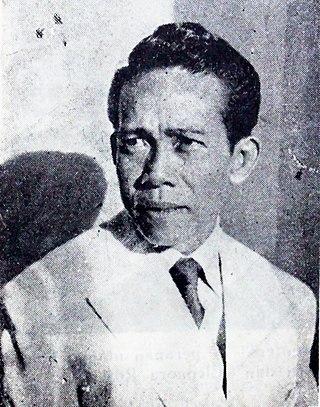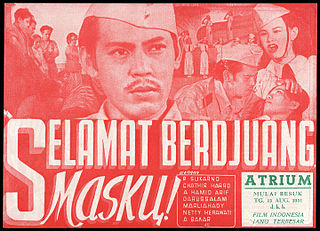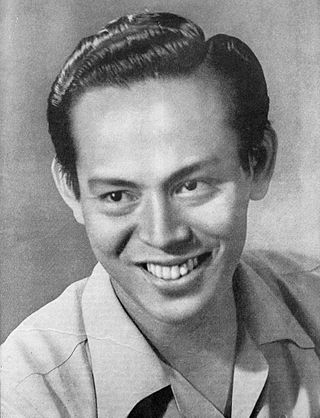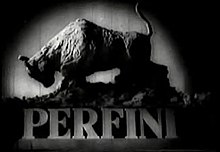
Lawrence Neville Brand was an American soldier and actor. He was known for playing villainous or antagonistic character roles in Westerns, crime dramas, and films noir, and was nominated for a BAFTA Award for his performance in Riot in Cell Block 11 (1954).
Ernest Laszlo, A.S.C. was a Hungarian-American cinematographer for over 60 films, and was known for his frequent collaborations with directors Robert Aldrich and Stanley Kramer. He was a member of the American Society of Cinematographers, and was its president from 1972 to 1974. He was an active member of the International Alliance of Theatrical Stage Employees.
The Constantin Film AG is a German mini-major film production and distribution company based in Munich. The company, which belongs to Swiss media conglomerate Highlight Communications AG, is a large independent German maker and distributor of productions in the entire field of audio-visual fiction and non-fiction. Company activity is based on the five pillars of film production/procurement of rights, TV production, film distribution, home entertainment and licence trading/TV exploitation. Constantin Film AG has released 36 of the 100 most successful German films of the last 20 years, including four of the Top 5: Manitou's Shoe, Traumschiff Surprise – Periode 1, Fack ju Göhte and Fack ju Göhte 2. The Fack ju Göhte trilogy was concluded in 2017 with Fack ju Göhte 3 and is now the most successful German film series of all time. Internationally, Constantin Film is best known for the successful Resident Evil film franchise, which has earned US$1.2 billion worldwide to date and is also known as the highest-grossing film series based on a video game. Most recent successes include TV series Shadowhunters, which won four People's Choice Awards in 2018, and the live-action Resident Evil television series. Constantin has also been involved in 20th Century Fox's Fantastic Four film franchise. Other productions include bestseller adaption The Silence and Monster Hunter.

Usmar Ismail was an Indonesian film director, author, journalist and revolutionary of Minangkabau descent. He is widely regarded as the native Indonesian pioneer of the cinema of Indonesia.
Kurt Hoffmann was a German film director, the son of Carl Hoffmann. He directed 48 films between 1938 and 1971. He ran a production company Independent Film along with Heinz Angermeyer.

Roy Engel was an American actor on radio, film, and television. He performed in more than 150 films and almost 800 episodes of television programs.

Djadoeg Djajakusuma was an Indonesian film director and promoter of traditional art forms. Born to a nobleman and his wife in Temanggung, Central Java, Djajakusuma became interested in the arts at a young age, choosing to pursue a career in theatre. During the Japanese occupation from 1943 to 1945 he was a translator and actor, and in the four-year national revolution which followed he worked for the military's educational division, several news agencies, and in drama.

Fifi Young was an Indonesian actress of mixed French and Chinese descent who acted in at least 86 films over her 34-year career.

Darah dan Doa is a 1950 Indonesian war film directed and produced by Usmar Ismail, telling the story of the Siliwangi Division and its leader Captain Sudarto on a march to West Java. Following Ismail's Dutch-produced Tjitra (1949), Darah dan Doa is often cited as the first 'Indonesian' film, and the film's first day of shooting – 30 March – is celebrated in Indonesia as National Film Day.

Max Tera was an Indonesian cinematographer and editor. He was employed by PERFINI in the 1950s and was a frequent collaborator with director Usmar Ismail.

Enam Djam di Jogja is a 1951 Indonesian film directed by Usmar Ismail. It was the second film to be produced under the PERFINI banner. Detailing the show of force in which the Indonesian republican army retook the capital at Yogyakarta for six hours, the film utilised much of the cast and crew from Ismail's previous work Darah dan Doa (1950). The film was a success in Indonesia and continued to be screened on the state television channel into the 1980s, even after two further films about the event were released.

Panggilan Darah is a 1941 film from the Dutch East Indies written and directed by Sutan Usman Karim and produced by Tjho Seng Han for Oriental Film. The black-and-white film starred Dhalia and Soerip as orphaned sisters trying to make a living in the colonial capital of Batavia before moving to Kudus to work at a clove cigarette factory.

Rara Patma Dewi Tjitrohadiseikusumo, best known under her stage name Chitra Dewi, was an Indonesian actress and director. She was noted for her roles in Usmar Ismail's films of the 1950s, appearing in films such as Tamu Agung, Tiga Dara, and Pedjuang, although she remained active in cinema until 1993 and won a Citra Award for Best Supporting Actress at the 1979 Indonesian Film Festival for Gara-gara Isteri Muda. Dewi also had a brief stint film directing in 1971, making her one of only six Indonesian women to direct a film before 1998.

Produksi Film Negara is an Indonesian state-owned film funding company, previously a film production company. PFN is one of the pioneers in Indonesian film industry at the time when it is formed.

Rempo Urip was an Indonesian film director. He began his career in the theatre, serving as an extra and footballer for the Dardanella theatre company beginning in 1934. After six years and three troupes, Urip entered the film industry, working as a distributor for Oriental Film and assistant director for Java Industrial Film. He returned to the theatre during the Japanese occupation (1942–1945) and national revolution (1945–1949). In 1951 he joined Djamaluddin Malik's Persari as a director, completing thirteen films for the company before it closed in 1958. He continued as a freelance director until 1977.

Selamat Berdjuang, Masku! is a 1951 Indonesian film directed by R.H. Andjar Subyanto and starring Raden Sukarno and Marlia Hardi. It follows a former guerrilla leader who must pursue his love despite the interference of his former comrades.

Raden Soekarno, better known as Rendra Karno, was an Indonesian actor. Born in Kutoarjo, Central Java, Soekarno entered the film industry in 1941, making his debut appearance in Union Films' Soeara Berbisa. Over the next forty years he appeared in more than fifty films. He was also involved in the theatre during the Japanese occupation of the Dutch East Indies and the Indonesian National Revolution. For his role in 1962's Bajangan di Waktu Fadjar, he was named best supporting actor at the 1963 Asian Film Festival in Tokyo.

Darussalam was an Indonesian actor who appeared in more than seventy films in his forty-year career. Born in Bengkulu, he studied to be nurse before migrating to theatre during the Japanese occupation of the Dutch East Indies, marrying Netty Herawaty while with the troupe Irama Masa. The couple spent the remainder of the occupation and the ensuing revolution touring the archipelago with a number of troupes. In 1949, Darussalam and Herawaty made their feature film debut in Fred Young's Saputangan, appearing in seven further Young productions before migrating to Djamaluddin Malik's Persari. During their eight years with the company, Darussalam and Herawaty travelled to the Philippines and Singapore and found popularity among audiences, though Darussalam remained in his wife's shadow.

Abdul Hamid Arief was an Indonesian actor who appeared in more than 120 films. Born in Batavia, Dutch East Indies, he started his acting career in theatre before migrating to film with 1948's Anggrek Bulan. His first starring role, and the one from which he first gained recognition, was as the title character in Pangeran Hamid. Over subsequent decades he was a productive film actor, often appearing in four or five films a year. He also acted in various television series.

Delma Juzar, also known as Del Yuzar, was an Indonesian actor and soldier turned lawyer. Juzar made his film debut in Darah dan Doa (1950) and starred in several films before going to the Faculty of Law at Universitas Indonesia in 1951.

















